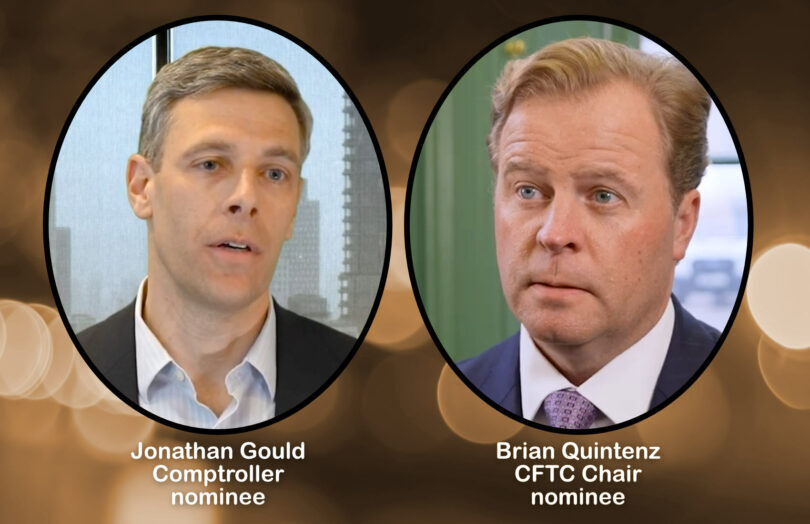Yesterday the White House released a list of Presidential nominations, including Jonathan Gould as Comptroller of the Currency and Brian Quintenz as Chair of the Commodity Futures Trading Commission (CFTC). Both would be considered crypto friendly.
Jonathan Gould as Comptroller
Jonathan Gould previously served as Senior Deputy Comptroller and Chief Counsel for two and half years. That period overlapped the nine months when Brian Brooks served as Acting Comptroller. He followed Brooks for an eight-month stint at crypto firm Bitfury, which was also the founder of the Global Blockchain Business Council (GBBC).
During his tenure as Acting Comptroller, Brooks published three interpretive letters that first allowed banks to hold stablecoin reserves and provide crypto custody, and later authorized them to participate in stablecoin networks. On his departure from his Acting Comptroller role, Brooks suggested that DeFi apps that provide deposit and lending services should be considered for bank charters.
The day before his departure, the OCC chartered Anchorage Digital. It is the only federally chartered crypto bank to date.
Gould is currently a partner at Jones Day, previously worked for BlackRock for 3.5 years and had two stints working for the Senate Banking Committee.
In a slightly unusual move, the nomination for Gould’s deputy is Joseph Otting. He previously served as Comptroller during Trump’s first term, but resigned abruptly, which was when Brian Brooks took his place. Hence, Otting, a former banker, was Gould’s boss during his tenure as Comptroller.
Quintenz to Chair CFTC after a16crypto role
Brian Quintenz is a high profile figure in the crypto community. He served a four year term as Commissioner at the CFTC until August 2021. He was nominated for the role by both Obama and Trump and was confirmed unanimously. Currently he is Head of Policy for a16zcrypto.
With Bitcoin and Ether being treated as commodities, CFTC is the relevant regulator. However, spot commodities trading venues are not required to register with the CFTC, whereas derivatives marketplaces must be licensed. For spot markets, the CFTC can only take action in cases of fraud or manipulation. This is why Congress has been considering providing the CFTC a larger role in regulating spot crypto markets. However, as an agency, it’s not really set up for that.
In terms of his policy positions, Quintenz outlined four philosophies at a16zcrypto:
- Regulations should reflect democratic values, support innovation
- Legislation and agency guidance should establish clear rules
- Businesses deserve access to financial services and lawful protections
- Regulate apps, not protocols.
Credit to Unchained Crypto for publishing the White House nomination list. Several news outlets have confirmed both nominations.












 All while Pfizer—a company with a $2.3 billion criminal fine for fraudulent marketing, bribery, and kickbacks—was given blanket immunity from liability and billions in taxpayer dollars to produce a vaccine in record time with no long-term safety data.
All while Pfizer—a company with a $2.3 billion criminal fine for fraudulent marketing, bribery, and kickbacks—was given blanket immunity from liability and billions in taxpayer dollars to produce a vaccine in record time with no long-term safety data.
























